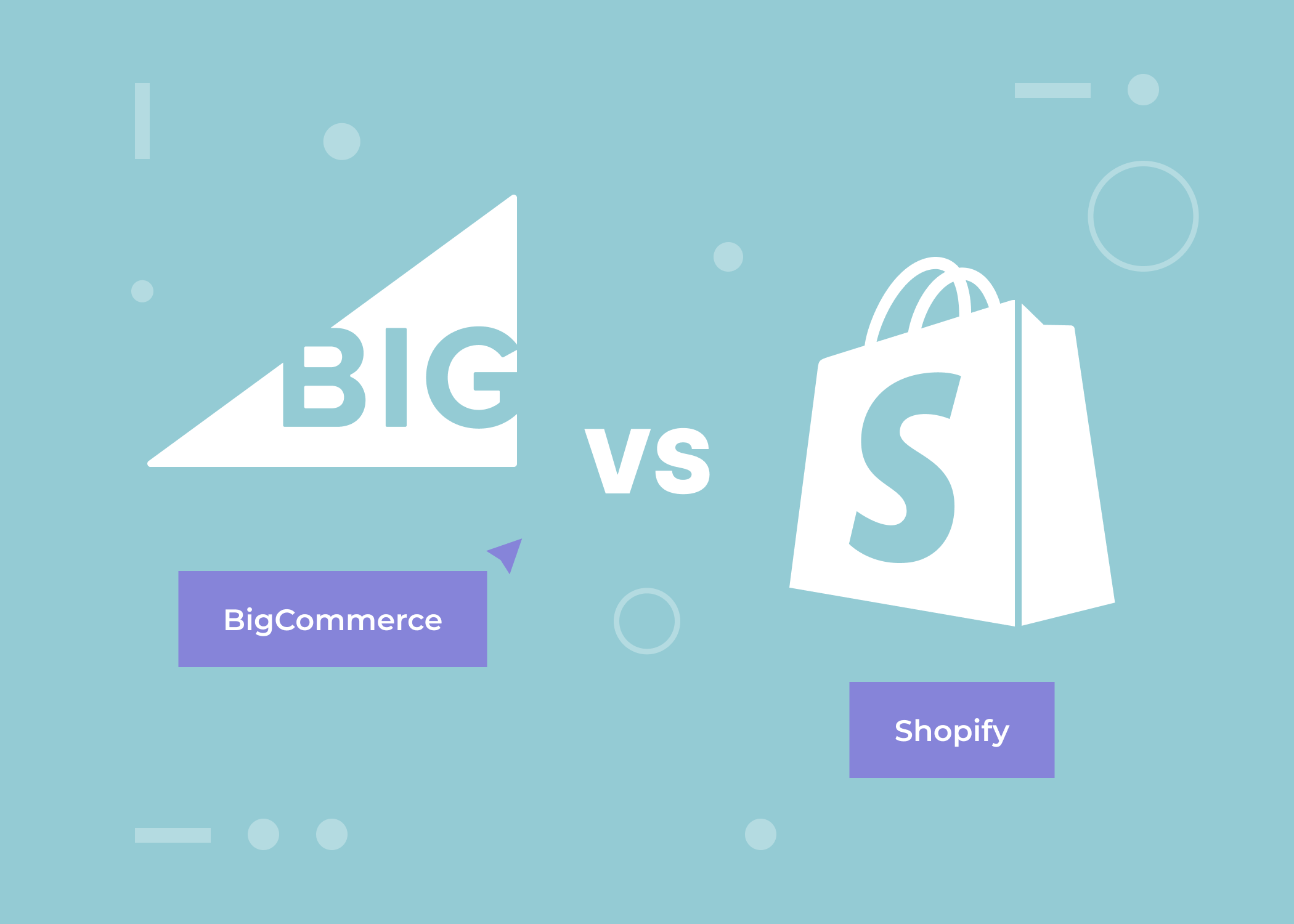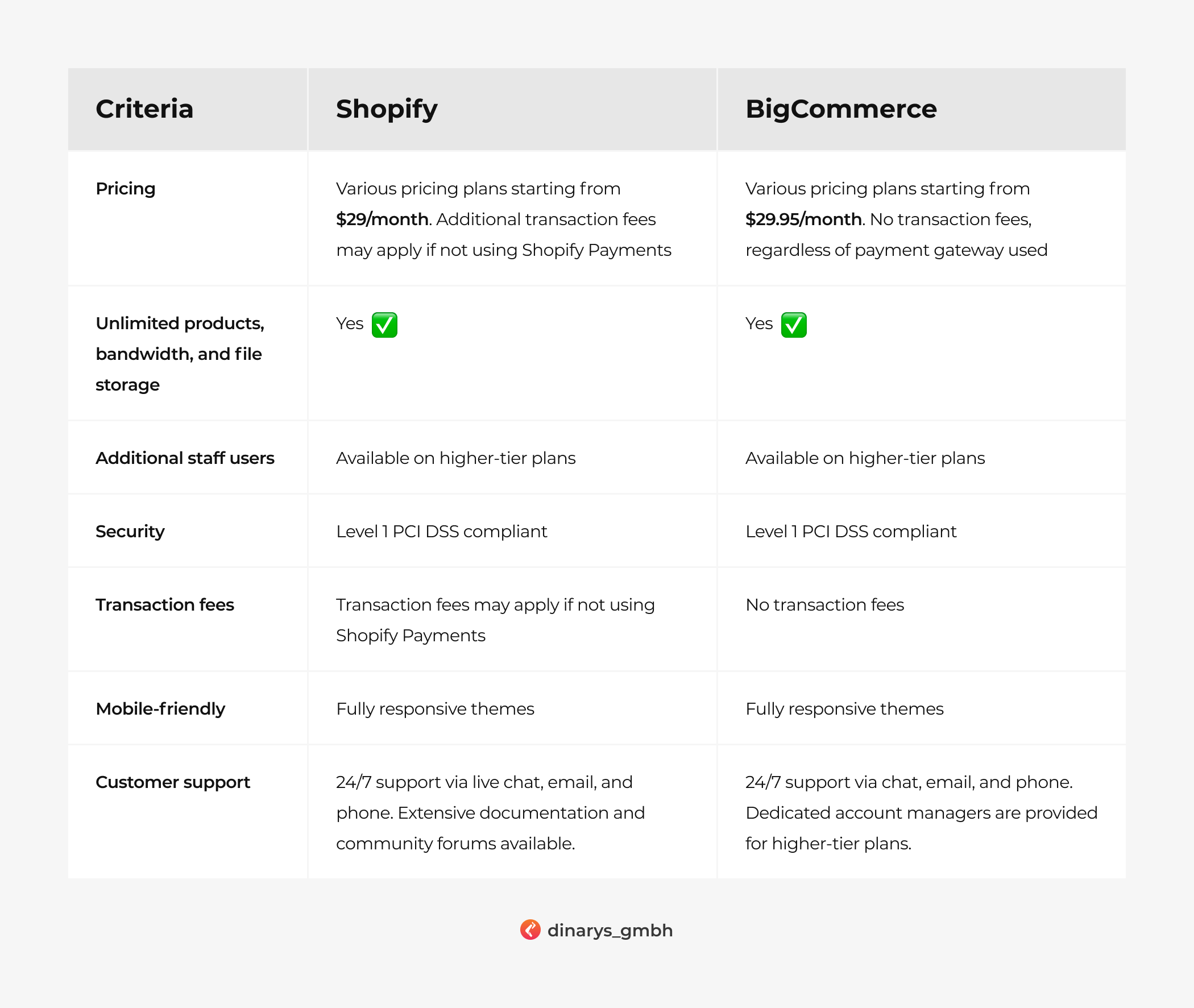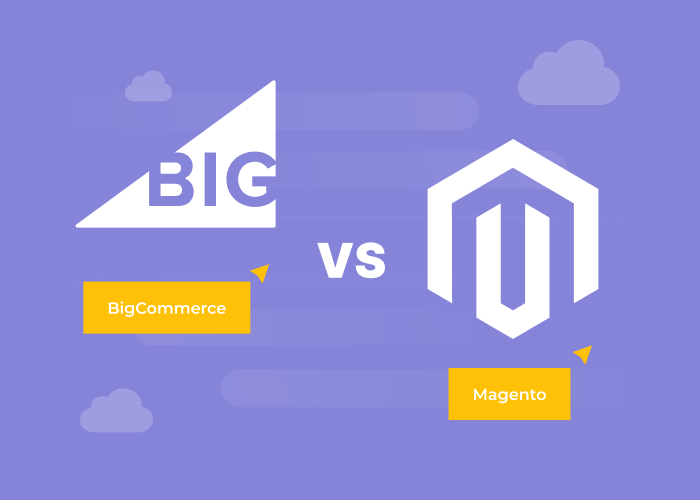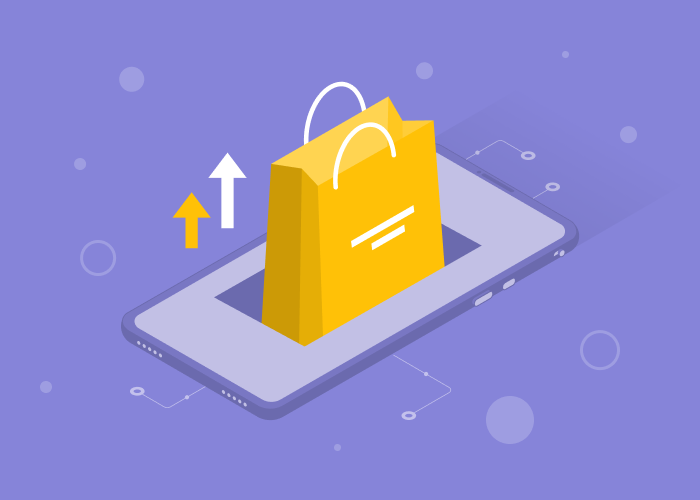Content
BigCommerce vs Shopify: How to Choose Your Ideal Ecommerce Platform

Time to read: 13 minutes
Our clients usually choose between BigCommerce and Shopify. Both Shopify and BigCommerce have solid reputations and robust features, but they each bring something different to the table that might make one more suitable for your specific needs.
In this article, we'll delve into a side-by-side comparison of both Shopify and Bigcommerce, focusing on aspects like ease of use, customization, app ecosystems, and pricing. Founded in 2006, Shopify has become a leading ecommerce platform, powering around 4.8 million stores worldwide as of 2024. Its user-friendly interface, extensive app ecosystem, and excellent customer support have made Shopify a popular choice for businesses of all sizes. Shopify offers a wide range of customizable themes, making it easy to create a professional online store without extensive technical knowledge.
On the other hand, BigCommerce, released in 2009, powers 44,000 stores globally, and this number is steadily growing in 2024.
While it may be used by fewer online stores compared to Shopify, BigCommerce has gained a reputation for its powerful built-in features and scalability.
Our aim is to provide you with the insights you need to make an informed decision about which platform will best support your ecommerce goals. Whether you’re aiming to scale your business, enhance your user experience, or streamline your operations, this comprehensive guide will help you effectively weigh your options.
By the end of this article, you’ll have a clear picture of how BigCommerce and Shopify compare, as well as which aligns best with your unique business requirements.
Let’s embark on our exploration of BigCommerce vs Shopify to understand their offerings and how they could align with your business blueprint.
Understanding Shopify vs BigCommerce
What exactly does BigCommerce bring to the table? And how can Shopify improve your user experience? When it comes to making a choice between BigCommerce vs Shopify for your online venture, there are many factors you should consider.
Catering primarily to mid-market and enterprise-level businesses, BigCommerce and Shopify offer an array of tools to help merchants scale efficiently.
One standout feature is BigCommerce’s lack of transaction fees, which can be a game-changer for businesses with high sales volumes. So, is BigCommerce better than Shopify?
Let’s compare Shopify and BigCommerce and find out which platform wins the eternal battle.
Overview of BigCommerce
BigCommerce is brimming with features designed to elevate online stores to the next level. With its user-friendly interface, even those new to digital marketplaces can navigate the waters with ease. Here’s what sets BigCommerce apart:
- Comprehensive toolkit: From product management to payment processing, BigCommerce provides an all-in-one solution to efficiently manage an online store.
- Customization galore: With a plethora of themes and customization options, your store can showcase its unique brand personality.
- SEO and marketing: Built-in SEO tools and marketing features ensure that your products get seen by the right people at the right time.
- Integrated sales channels: Expand your reach by selling on multiple platforms such as Facebook, Instagram, and Amazon, all synchronized within BigCommerce.
These features are just the tip of the iceberg. Each is designed to give users a competitive edge in the digital marketplace.
Key advantages of BigCommerce
When considering a platform that can grow with your business, scalability is a term you’ll often encounter. But what does scalability look like in the world of ecommerce? Let’s delve into the multichannel capabilities of BigCommerce to understand why it stands out as a scalable solution for businesses on the rise.
- Multichannel selling capabilities
The modern consumer shops across a multitude of channels, from social media to online marketplaces and beyond. BigCommerce responds to this shopping behavior by offering robust multichannel selling capabilities.
Multichannel selling allows retailers to seamlessly list and sell products across various platforms such as Facebook, Instagram, Amazon, and eBay right from their BigCommerce dashboard. These integrations not only centralize inventory management but also provide an opportunity to reach customers wherever they prefer to shop, amplifying potential sales and enhancing the customer experience.
- Mid-market and larger enterprises
Mid-market to larger enterprises have particular needs when it comes to e-commerce: reliability, advanced functionality, and the ability to handle high volumes of traffic and sales. BigCommerce caters to these needs with its enterprise-grade solutions. The platform is designed to manage complex catalogs, high-order volumes, and intricate B2B relationships with ease.
Moreover, the availability of APIs for custom integrations means that businesses can scale and adapt their operations as needed without switching platforms.
- Growth with your business
Growth is multifaceted, especially in ecommerce. You may require specific features to address different areas of growth, from customer acquisition to retention and operational efficiency. BigCommerce offers targeted features such as customer segmentation, which allows for personalized marketing and abandoned cart recovery to improve conversion rates.
Last but not least, BigCommerce is loaded with an array of shipping options. These features are not just add-ons but rather integral parts of a cohesive system designed to meet the specific needs of growing businesses.
Check out how easy it is to enter the ecommerce sphere with BigCommerce and Dinarys.
- Easy market expansion
Imagine being able to connect with customers across the globe, at any time, without the constraints of physical location. BigCommerce makes this possible through its integrated online sales channels, which include prominent marketplaces like Amazon and eBay alongside social media platforms such as Instagram and Facebook.
Using these channels effectively can exponentially increase your online store visibility and attract a diverse customer base. Furthermore, with native integration of international payment gateways and shipping providers, BigCommerce enables seamless cross-border transactions, ensuring your products are accessible to a global audience.
- Optimized conversion rates
Driving traffic to your store is just the first step. The key to growth lies in converting visitors into paying customers. BigCommerce offers a suite of tools designed to optimize conversion rates. For starters, it boasts high-performing checkout processes that reduce cart abandonment. These include features like one-page checkout and guest checkout options, which streamline purchasing.
BigCommerce provides robust built-in Google analytics and reporting tools that allow you to track customer behavior, identify trends, and make data-driven decisions to fine-tune your marketing and sales strategies. By analyzing which products are performing well and which are not, BigCommerce users can adjust inventory and marketing efforts accordingly, maximizing the chances of conversion.
BigCommerce compare to other ecommerce platforms reveals that it offers a more comprehensive set of built-in features, making it an excellent choice for businesses that want to scale without relying heavily on third-party apps.
Mastering BigCommerce is an exciting and continuous journey. With its rich array of features and tools designed for growth, there’s no ceiling to what your business can achieve. Implement strategies, share your journey, and watch your business soar to new heights.
As a certified BigCommerce partner, we can help you move your existing business to BigCommerce, optimize or configure your current BigCommerce store for superior performance, or build new modules that are right for your company. One more thing to remember: We offer a free kick-off consultation. Don’t miss your chance to book your spot.
Lets talk about itHave a project in mind?
Overview of Shopify
Shopify is a cloud-based multichannel commerce platform designed for small to midsize businesses. Entrepreneurs can use Shopify to design, set up, and manage stores across multiple sales channels, including web, mobile, social media, marketplaces, brick-and-mortar locations, and pop-up shops.
The platform is renowned for its user-friendly interface that simplifies the complexities of online retail, enabling Shopify users to focus on the operational aspects of their businesses without worrying about the technicalities of website hosting and maintenance.
Compared to BigCommerce, Shopify dances to a slightly different beat, boasting its own strengths that make it a crowd favorite. As one of the most popular ecommerce platforms globally, Shopify prides itself on being incredibly user-friendly, making it a go-to choice for budding entrepreneurs and small to midsize businesses.
And while Shopify is easy to use, that doesn’t come at the expense of power. Thanks to a rich app store, most any functionality not included out of the box can be added with a few clicks. Moreover, Shopify’s ability to handle varying levels of complexity caters to both novices and e-commerce veterans alike.
For example, Shopify POS is a powerful tool for businesses looking to streamline their sales process, as it allows you to easily manage your products, customers, and orders. With Shopify POS, you can get valuable insights and analytics to help you make data-driven decisions and grow your business.
Shopify’s robust toolkit is what truly sets it apart as a leader in ecommerce solutions. Some of Shopify’s key features include:
- Storefront customization: A variety of themes and an advanced website builder allow for the creation of a unique, brand-aligned Shopify store without needing to code.
- Shopping cart: A secure shopping cart supports over 100 payment gateways, offers flexible shipping options, and handles taxes automatically.
- Store management: Comprehensive backend support helps with inventory management, product organization, and order fulfillment.
- Marketing & SEO: Built-in SEO features, along with marketing tools and integrations, help drive traffic and sales.
- Analytics: Detailed analytics provide insights into sales trends, customer behavior, and store performance.
- Mobile app: Conveniently manage your store on the go with the Shopify mobile app.
These features collectively provide a solid foundation for building and scaling an online business.
Shopify’s strengths to consider
- Intuitive interface that simplifies setup and management
- Access to over 6,000 apps to extend your store’s capabilities
- Flexible pricing plans, including Shopify Lite for adding purchases to blogs or existing websites
- 24/7 customer support via phone, email, and live chat
- Focus on mobile responsiveness and social commerce integrations
To fully reap the benefits of the Shopify platform, you need a trusted tech partner. Dinarys is a licensed Shopify development company, covering a full spectrum of ecommerce services from store setup and migration to custom integrations and module development.
Still not sure whether to pick BigCommerce vs Shopify? Contact us for a free expert consultation, or continue reading and get a free checklist for choosing the right ecommerce platform for your business.
Lets talk about itHave a project in mind?
Your next destination: BigCommerce or Shopify?
When considering these two titans of ecommerce side by side, several key differences emerge. When it comes to scalability, for instance, both platforms are designed to support growth, but they do so in distinct ways.
BigCommerce tends to shine for businesses with large inventories and complex needs, as it provides more built-in features aimed at large-scale operations without charging additional fees for each sale. On the other hand, Shopify wins when it comes to scalability. Its expansive Shopify App Store allows store owners to add features as needed.
Let’s delve deeper into the scalability and customization of Shopify vs BigCommerce. BigCommerce offers an open API and allows for extensive customization through HTML, CSS, and JavaScript, giving merchants the freedom to tailor their stores to their precise requirements. Shopify also offers solid customization options but often relies on third-party apps to match the level of bespoke customization that BigCommerce can offer natively.
Furthermore, the realm of integrations is where the two platforms show their true colors. BigCommerce boasts an impressive array of pre-integrated applications and free templates, reducing the need for external apps that can slow down a site. Shopify counters with its massive app ecosystem, which includes exclusive partnerships and a wide range of integrations, albeit sometimes at an additional cost.
Shopify versus BigCommerce: Full comparison

When considering Shopify Plus vs BigCommerce, it’s essential to recognize Shopify Plus as the enterprise version of Shopify. Shopify Plus offers an elevated level of customization, scalability, and features tailored specifically for enterprises. With Shopify Plus, businesses gain access to advanced tools, dedicated support, and seamless integrations, empowering them to efficiently scale their operations. On the other hand, BigCommerce also caters to enterprise needs with its robust features, multichannel sales functionality, and 24/7 support.
The final aspect of our Shopify vs BigCommerce comparison is pricing.
The pricing structures for Shopify and BigCommerce are similar in some respects but differ in others. Here’s a breakdown:
Shopify offers several pricing plans:
- Basic Shopify: $29/month
- Shopify: $79/month
- Advanced Shopify: $299/month
- Shopify Plus: Custom pricing for enterprise-level solutions
Additional costs may include transaction fees if you don’t use Shopify Payments and fees for using external payment gateways.
BigCommerce also offers multiple pricing tiers:
- Standard: $29.95/month
- Plus: $79.95/month
- Pro: $299.95/month
- Enterprise: Custom pricing for large-scale businesses
BigCommerce doesn’t charge transaction fees, regardless of the payment gateway used, which can be advantageous for businesses with high transaction volumes.
While comparing BigCommerce and Shopify pricing, we’ve found that both platforms offer tiered pricing structures with options for businesses of various sizes. The key difference lies in transaction fees: whereas Shopify may incur additional charges (Shopify Payments), BigCommerce does not.
Your ultimate checklist to choosing BigCommerce or Shopify
When choosing between BigCommerce and Shopify, ecommerce businesses should consider the following factors:
- Determine your business size and scalability needs:
- Assess your current business size and anticipated growth
- Consider whether BigCommerce or Shopify better aligns with your scalability requirements
- Evaluate ease of use:
- Test the user interface of both platforms
- Determine which platform offers the right balance of simplicity and advanced features for your team
- Compare pricing and transaction fees:
- Review the pricing plans of BigCommerce and Shopify
- Calculate the transaction fees associated with each platform based on your sales volume
- Determine which platform offers the most cost-effective solution for your business
- Verify payment gateway compatibility:
- Identify your preferred payment gateway
- Confirm that your chosen platform integrates seamlessly with your preferred payment gateway
- Assess theme selection and customization options:
- Browse the theme marketplaces of both BigCommerce and Shopify
- Evaluate the quality, variety, and customization options of the available themes
- Determine which platform offers themes that best suit your brand and design preferences
- Explore app and integration ecosystems:
- Identify the specific functionalities and integrations your online store requires
- Research the app marketplaces of BigCommerce and Shopify
- Assess which platform offers the apps and integrations that best meet your needs
- Review SEO and marketing features:
- Evaluate the built-in SEO tools and capabilities of each platform
- Identify any additional SEO apps or integrations you may need
- Determine which platform provides the most comprehensive SEO and marketing features for your business
- Evaluate customer support and resources:
- Assess the quality and availability of customer support for each platform
- Review the documentation, tutorials, and community resources available
- Determine which platform offers the level of support and resources you require
- Consider multi-channel selling requirements:
- Identify the sales channels you plan to use (e.g., marketplaces, social media)
- Verify that your chosen platform supports your desired sales channels
- Evaluate any differences in multi-channel selling capabilities between BigCommerce and Shopify
- Address specific business requirements:
- Identify any unique requirements your business has (e.g., product types, shipping, compliance)
- Determine how well each platform accommodates your specific needs
- Select the platform that best aligns with your business's unique requirements
By assessing these factors and prioritizing those that are most important to your business, you can make an informed decision between BigCommerce and Shopify. It’s also a good idea to take advantage of free trials to test out each platform before making a final decision.
Summing Up
The choice between BigCommerce versus Shopify hinges on specific business needs and growth aspirations. Shopify is ideal for those who value ease of use and a vast app ecosystem, making it suitable for small to midsize businesses. On the other hand, BigCommerce is preferable for businesses that anticipate rapid growth and require more built-in features at no additional costs.
Shopify is an excellent choice for businesses that prioritize simplicity and user-friendliness. Its intuitive interface and extensive app marketplace make it easy for even non-technical users to set up and manage their online store. Shopify's vast ecosystem of apps and integrations allows businesses to extend their store's functionality and customize it to their specific needs. This makes Shopify particularly well-suited for small to medium-sized businesses that want a reliable and easy-to-use e-commerce solution.
On the other hand, BigCommerce is a more powerful platform that offers a wide range of built-in features and tools. It is designed to accommodate businesses that anticipate rapid growth and require advanced functionality without incurring additional costs. BigCommerce provides robust SEO capabilities, flexible product management, and a comprehensive set of marketing and analytics tools out of the box. This makes it an ideal choice for businesses that want to scale quickly and have more control over their online store's functionality.
Carefully consider your business model, compare BigCommerce vs Shopify prices, analyze your technical capabilities, and think about your future goals when choosing between Shopify and BigCommerce. If you still have questions, contact us and we’ll help you navigate the deep waters of ecommerce.
Let professionals meet your challenge
Our certified specialists will find the most optimal solution for your business.



